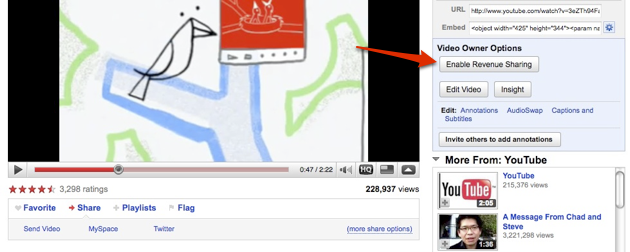 Over a year and a half ago, YouTube launched a new Partner Program that allowed some of its most prolific and popular content owners to make some money from the content they contributed, inviting them to get a revenue share of ads placed against their videos. This was all well and good for YouTube’s cream of the crop, but let’s be honest — most of us don’t contribute all that regularly, and the vast majority of our videos don’t become popular, which means we couldn’t get into the program. What’s worse, even when one of your videos suddenly did go viral, if you weren’t already in the program there wasn’t anything you could do to reap the benefits. Today, that changes: YouTube is launching a new addition to its Partnership Program that will give anyone the chance to make some money when lightning strikes, even if it’s the first video they’ve ever uploaded.
Over a year and a half ago, YouTube launched a new Partner Program that allowed some of its most prolific and popular content owners to make some money from the content they contributed, inviting them to get a revenue share of ads placed against their videos. This was all well and good for YouTube’s cream of the crop, but let’s be honest — most of us don’t contribute all that regularly, and the vast majority of our videos don’t become popular, which means we couldn’t get into the program. What’s worse, even when one of your videos suddenly did go viral, if you weren’t already in the program there wasn’t anything you could do to reap the benefits. Today, that changes: YouTube is launching a new addition to its Partnership Program that will give anyone the chance to make some money when lightning strikes, even if it’s the first video they’ve ever uploaded.
Here’s how it works: YouTube will be monitoring its site for videos that quickly go viral, and will then reach out to the content uploader with an Email invitation to “Enable Revenue Sharing” on that video. If you choose to enable the feature, then YouTube will place ads against the video and will give you a cut, which gets paid into your Google AdSense account. YouTube’s criteria for joining the program are vague — the site plans to look at the number of views a video gets, its virality, and compliance with the site’s Terms of Service, but it has offered no concrete numbers.

YouTube says that participants in the new program won’t get all the benefits of the normal Partner Program (you won’t be able to choose other videos you’d like to monetize, for example), so it encourages users to apply for the program here.
Tom Pickett, Director of Online Sales and Operations at YouTube, said on a conference call today that the move is meant to help expand the reach of the site’s partner program. The company will address not just new viral videos, but also videos on the site that have never been monetized but are extremely popular (Pickett says that many viral videos have quite lengthly lifespans — once you’re popular, you can stay popular for years). Pickett says that the company expects to “increase the number of partners dramatically” up into the tens of thousands of partners (up from “thousands). The revenue share will be the same as what applies to the general Partnership Program, with the majority of the revenue going to the content contributor.
YouTube spokesman Aaron Zamost says that advertisers have actually been requesting a feature like this for a while, as there have been a number of user-uploaded videos that were not being monetized at all, and in turn couldn’t have ads placed against them. Now, provided the content unloader decides to join the program, these advertisers will be able to take advantage of these viral videos.